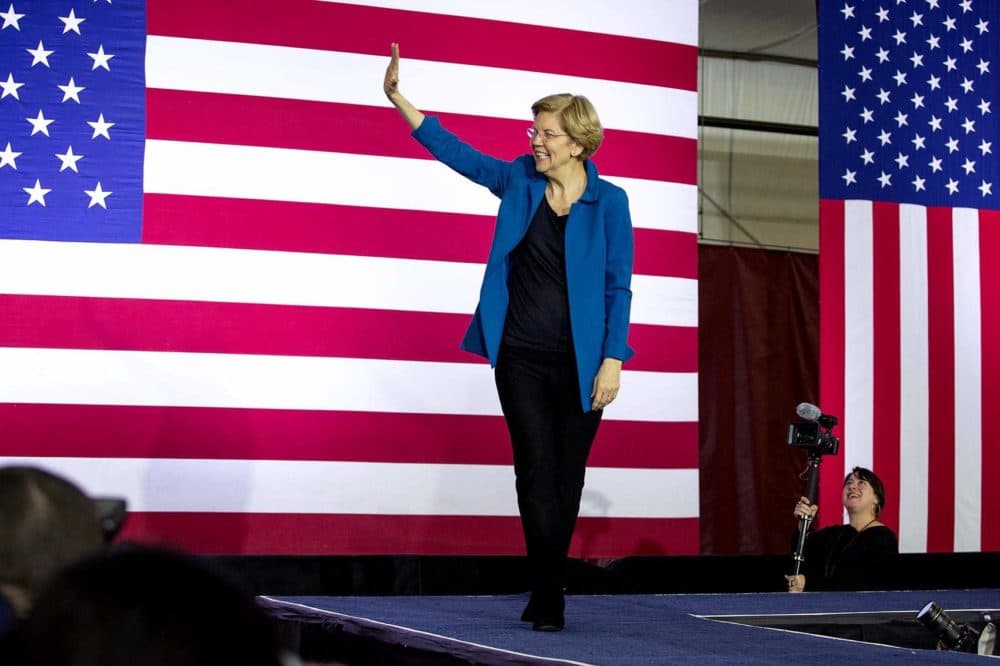Advertisement
Trump Worries And 'Bernie Lite': Dissecting Warren's N.H. Loss As She Tries To Leave It Behind
Resume
Elizabeth Warren is trying to leave the New Hampshire primary behind her as she heads out this week to campaign in Nevada, which holds its caucuses on Feb. 22.
Days after the first-in-the-nation primary, the Massachusetts senator's defeat saw political analysts, and certainly some of her supporters, trying to make sense of her distant fourth-place finish.
Last November, Warren was leading in the polls and seemed to be the candidate to beat in New Hampshire.
Andrew Smith, director of the University of New Hampshire Survey Center, said early on, Warren — a progressive also acceptable to the moderate wing of the Democratic Party — was seen as the more electable version of fellow progressive Sen. Bernie Sanders.
"But that seemed to wear off, and I think it started in the fall, when she made some missteps during and after a debate on her positions on health care, and once she got off her stride from that, she never really recovered," Smith said.
Warren began to slide in the polls and was not helped by her third-place finish in Iowa.
But there was a moment this week when it still seemed possible she could have a respectable finish, and at least pick up some delegates.
It was Monday, the night before the primary. About 800 people packed Portsmouth's South Church and an overflow space to hear Warren. Many were still undecided. They did not know whether they should vote for Warren — the candidate they liked best — or one they thought their independent and Republicans friends could get behind.
"I have two choices: Amy [Klobuchar] and Elizabeth," said Alison O'Malley, who came to the church from her home in Rye Beach.
That was also the choice before Renee Giffroy, also from Rye. But by Monday night, Giffroy was leaning toward Minnesota Sen. Amy Klobuchar. Her top priority was voting for someone she thought could win.
"I have friends that say that if we put up somebody that's too liberal, like either certainly Bernie, but sometimes even Warren, then they won't vote for them, because they're independents or some of them are former Republicans that don't want to vote for Trump again," she explained. "So because of that, I feel like I want somebody that's going to be in the middle that's going to bring the whole country together."
For months, Katie Paine had been trying to decide between former South Bend, Ind., Mayor Pete Buttigieg and Warren. To make up her mind, she said she came from Durham to hear Warren speak Monday night.
"I love her ideas," said Paine. "I love her passion. I love the fact that she's a woman. I'm concerned about Elizabeth, because she's perceived as too liberal or too out there, or too preachy."
Exit polls don't reveal why Warren voters chose other candidates.
But they do show Buttigieg won with people who make $100,000 or more — a group that was expected to support Warren. He also won people who oppose changing to a single government health plan, and, perhaps most important, voters who want a candidate who can beat President Trump.
Meanwhile, Klobuchar, not Warren, won college graduates — a group Warren was also expected to do well with.
Exit polls also show half the voters said they made their choice in the last few days. That seems to have benefited Buttigieg and Klobuchar most.
By Tuesday, as people were leaving the polls, it was clear two things were happening:
First, UNH's Andy Smith said, Sanders' supporters were sticking with the Vermont senator, who ultimately eked out a victory in the Granite State.
"Elizabeth Warren, I believe, suffered from being Bernie Lite in a time when the electorate in New Hampshire wanted the full-strength Bernie," Smith said.
And second, the voters most worried about getting their friends and neighbors to vote against Trump chose Buttigieg and Klobuchar.
This segment aired on February 13, 2020.
